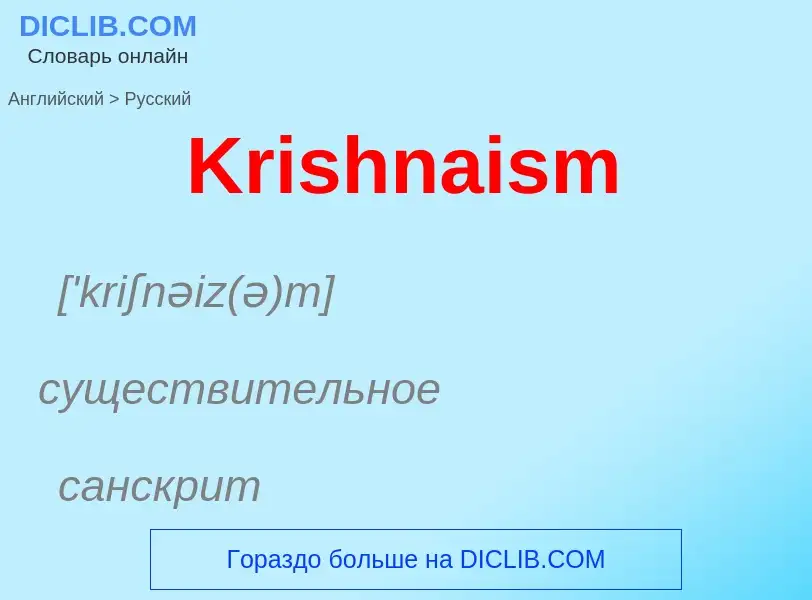Traduzione e analisi delle parole tramite l'intelligenza artificiale ChatGPT
In questa pagina puoi ottenere un'analisi dettagliata di una parola o frase, prodotta utilizzando la migliore tecnologia di intelligenza artificiale fino ad oggi:
- come viene usata la parola
- frequenza di utilizzo
- è usato più spesso nel discorso orale o scritto
- opzioni di traduzione delle parole
- esempi di utilizzo (varie frasi con traduzione)
- etimologia
Krishnaism - traduzione in russo
['kriʃnəiz(ə)m]
существительное
санскрит
культ бога Кришны
['kriʃnə]
существительное
['kriʃnə]
общая лексика
sanskr. (бог) Кришна
санскрит
(бог) Кришна
география
р. Кришна
Definizione
Wikipedia

Krishnaism (IAST: Kṛṣṇaism) is a large group of independent Hindu traditions—sampradayas related to Vaishnavism—that center on the devotion to Krishna as Svayam Bhagavan, Ishvara, Para Brahman, the source of all reality, who is not an avatar of Vishnu. This is its difference from such Vaishnavite groupings as Sri Vaishnavism, Sadh Vaishnavism, Ramaism, Radhaism, Sitaism etc. There is also a personal Krishnaism, that is devotion to Krishna outside of any tradition and community, as in the case of the saint-poet Meera Bai. Leading scholars do not define Krishnaism as a suborder or offshoot of Vaishnavism, considering it a parallel and no less ancient current of Hinduism.
The teachings of the Bhagavad Gita can be considered as the first Krishnaite system of theology. Krishnaism originated in the late centuries BCE from the followers of the heroic Vāsudeva Krishna, which amalgamated several centuries later, in the early centuries CE, with the worshipers of the "divine child" Bala Krishna and the Gopala-Krishna traditions of monotheistic Bhagavatism. These non-Vedic traditions in Mahabharata canon affiliate itself with ritualistic Vedism in order to become acceptable to the orthodox establishment. Krishnaism becomes associated with bhakti yoga and bhakti movement in the Medieval period.
The most remarkable Hindu scriptures for the Krishnaites became Bhagavad Gita, Harivamsa (appendix to the Mahabharata), and Bhagavata Purana.




![Maha-mantra ''Hare Krishna'' in [[Devanagari]] script. Maha-mantra ''Hare Krishna'' in [[Devanagari]] script.](https://commons.wikimedia.org/wiki/Special:FilePath/Hare Krshna (Mahamantra).png?width=200)

![[[Heliodorus pillar]] that was made by Heliodorus 110 BCE after his conversion to [[Bhagavata]] monotheism. [[Heliodorus pillar]] that was made by Heliodorus 110 BCE after his conversion to [[Bhagavata]] monotheism.](https://commons.wikimedia.org/wiki/Special:FilePath/Heliodorus-Säule1.jpg?width=200)
![[[Warkari]] pilgrims, [[Maharashtra]]. [[Warkari]] pilgrims, [[Maharashtra]].](https://commons.wikimedia.org/wiki/Special:FilePath/Hindu pilgrims in Maharashtra.jpg?width=200)
![The first inscription of the [[Heliodorus pillar]]. The first inscription of the [[Heliodorus pillar]].](https://commons.wikimedia.org/wiki/Special:FilePath/Inscription of Heliodorus pillar.gif?width=200)

![Jor Mandir Temple in Bishnupur]]. Jor Mandir Temple in Bishnupur]].](https://commons.wikimedia.org/wiki/Special:FilePath/Kirtan at Bishnupur.jpg?width=200)
![paripurna avatara]]'' of Vishnu and as Svayam Bhagavan. paripurna avatara]]'' of Vishnu and as Svayam Bhagavan.](https://commons.wikimedia.org/wiki/Special:FilePath/Krishna as the supreme deity in relation to Vishnu.png?width=200)

![[[Ratha Yatra (Puri)]], the Odia chariot festival. [[Ratha Yatra (Puri)]], the Odia chariot festival.](https://commons.wikimedia.org/wiki/Special:FilePath/Puri Ratha Yatra.jpg?width=200)
![[[Dwarkadhish Temple]], [[Dwarka]], Gujarat [[Dwarkadhish Temple]], [[Dwarka]], Gujarat](https://commons.wikimedia.org/wiki/Special:FilePath/Dwarkadheesh temple.jpg?width=200)
![[[Jagannath Temple, Puri]], Odisha [[Jagannath Temple, Puri]], Odisha](https://commons.wikimedia.org/wiki/Special:FilePath/Sri Jagannath Temple, Puri. India.jpg?width=200)
![[[Govind Dev Ji Temple]], [[Jaipur]], Rajasthan [[Govind Dev Ji Temple]], [[Jaipur]], Rajasthan](https://commons.wikimedia.org/wiki/Special:FilePath/Shree Govind Dev Ji Temple Jaipur Rajasthan.jpg?width=200)
![[[Vithoba Temple]], Maharashtra [[Vithoba Temple]], Maharashtra](https://commons.wikimedia.org/wiki/Special:FilePath/Pandharpur Vithoba temple.jpg?width=200)
![[[Radha Damodar Temple, Junagadh]], Gujarat [[Radha Damodar Temple, Junagadh]], Gujarat](https://commons.wikimedia.org/wiki/Special:FilePath/Damodar Kund - Junagadh - Gujarat - DSC005.jpg?width=200)
![[[Guruvayur Temple]], [[Guruvayur]], Kerala [[Guruvayur Temple]], [[Guruvayur]], Kerala](https://commons.wikimedia.org/wiki/Special:FilePath/Guruvayoor Temple 1.jpg?width=200)
![[[Radha Madan Mohan Temple, Vrindavan]] [[Radha Madan Mohan Temple, Vrindavan]]](https://commons.wikimedia.org/wiki/Special:FilePath/MadanMohanmandir.jpg?width=200)
![[[Rasmancha, Bishnupur]], West Bengal [[Rasmancha, Bishnupur]], West Bengal](https://commons.wikimedia.org/wiki/Special:FilePath/Raas Mancha.jpg?width=200)
![Kalna]] Kalna]]](https://commons.wikimedia.org/wiki/Special:FilePath/Kalna Lalji Temple.jpg?width=200)
![[[Ningthoukhong]] Gopinath Temple, [[Manipur]] [[Ningthoukhong]] Gopinath Temple, [[Manipur]]](https://commons.wikimedia.org/wiki/Special:FilePath/Gopinath Temple - Ningthoukhong, Manipur (India).jpg?width=200)
![[[Radha Raman Temple]], [[Vrindavan]] [[Radha Raman Temple]], [[Vrindavan]]](https://commons.wikimedia.org/wiki/Special:FilePath/Entrance Radha Raman Temple, Vrindavan.jpg?width=200)
![Yogapith Temple, [[Mayapur]] Yogapith Temple, [[Mayapur]]](https://commons.wikimedia.org/wiki/Special:FilePath/Yogapith, Mayapur.jpg?width=200)
![[[Mayapur Chandrodaya Mandir]], [[Mayapur]] [[Mayapur Chandrodaya Mandir]], [[Mayapur]]](https://commons.wikimedia.org/wiki/Special:FilePath/Chandroday mandir uc side view.jpg?width=200)
![Sri Radha Krishna-chandra Temple]], [[Bangalore]] Sri Radha Krishna-chandra Temple]], [[Bangalore]]](https://commons.wikimedia.org/wiki/Special:FilePath/Iskon bangalore.jpg?width=200)
![[[Madhupur Satra]], West Bengal [[Madhupur Satra]], West Bengal](https://commons.wikimedia.org/wiki/Special:FilePath/Madhupur satra at Kochbihar.jpg?width=200)
![[[Barpeta Satra]], Assam [[Barpeta Satra]], Assam](https://commons.wikimedia.org/wiki/Special:FilePath/Sankardev Satra Patbausi, Barpeta.jpg?width=200)
![Golaghat]], Assam Golaghat]], Assam](https://commons.wikimedia.org/wiki/Special:FilePath/আঠখেলীয়া নামঘৰ । গোলাঘাট ।.jpg?width=200)
![Patna]], Madhya Pradesh Patna]], Madhya Pradesh](https://commons.wikimedia.org/wiki/Special:FilePath/Mahamati Prannathji Temple Panna Madhya Pradesh India.jpg?width=200)
![Prem Mandir]], [[Vrindavan]] Prem Mandir]], [[Vrindavan]]](https://commons.wikimedia.org/wiki/Special:FilePath/Prema Mandir 4.jpg?width=200)
